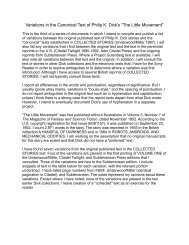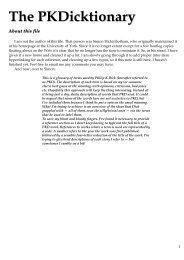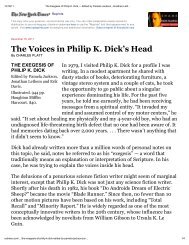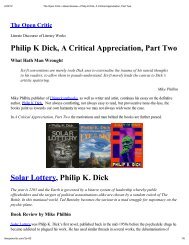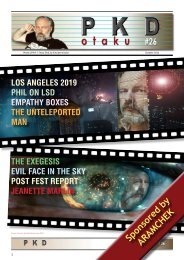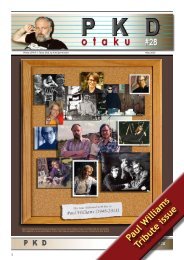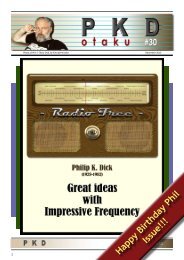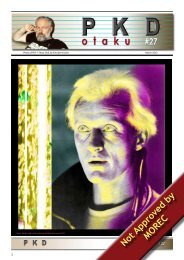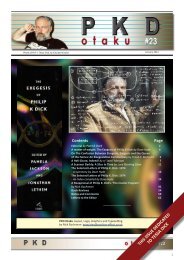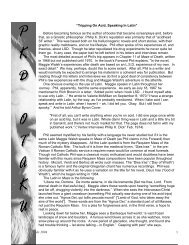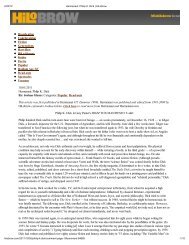The Second Coming of Philip K. Dick - Philip K. Dick Fan Site
The Second Coming of Philip K. Dick - Philip K. Dick Fan Site
The Second Coming of Philip K. Dick - Philip K. Dick Fan Site
You also want an ePaper? Increase the reach of your titles
YUMPU automatically turns print PDFs into web optimized ePapers that Google loves.
11/18/11 Wired 11.12: <strong>The</strong> <strong>Second</strong> <strong>Coming</strong> <strong>of</strong> <strong>Philip</strong> K. <strong>Dick</strong><br />
<strong>of</strong> us experience. Vanilla Sky, with its dizzying shifts between fantasy and fact, likewise ventures into<br />
a <strong>Dick</strong>ian warp zone, as does Dark City, <strong>The</strong> Thirteenth Floor, and David Cronenberg's eXistenZ.<br />
Memento reprises <strong>Dick</strong>'s memory obsession by focusing on a man whose attempts to avenge his<br />
wife's murder are complicated by his inability to remember anything. In <strong>The</strong> Truman Show, Jim Carrey<br />
discovers the life he's living is an illusion, an idea <strong>Dick</strong> developed in his 1959 novel Time Out <strong>of</strong> Joint.<br />
Next year, Carrey and Kate Winslet will play a couple who have their memories <strong>of</strong> each other erased<br />
in Eternal Sunshine <strong>of</strong> the Spotless Mind. Memory, paranoia, alternate realities: <strong>Dick</strong>'s themes are<br />
everywhere.<br />
At a time when most 20th-century science fiction writers seem hopelessly dated, <strong>Dick</strong> gives us a<br />
vision <strong>of</strong> the future that captures the feel <strong>of</strong> our time. He didn't really care about robots or space<br />
travel, though they sometimes turn up in his stories. He wrote about ordinary Joes caught in a web<br />
<strong>of</strong> corporate domination and ubiquitous electronic media, <strong>of</strong> memory implants and mood dispensers<br />
and counterfeit worlds. This strikes a nerve. "People cannot put their finger anymore on what is real<br />
and what is not real," observes Paul Verhoeven, the one-time Dutch mathematician who directed<br />
Total Recall. "What we find in <strong>Dick</strong> is an absence <strong>of</strong> truth and an ambiguous interpretation <strong>of</strong> reality.<br />
Dreams that turn out to be reality, reality that turns out to be a dream. This can only sell when<br />
people recognize it, and they can only recognize it when they see it in their own lives."<br />
Like the babbling psychics who predict future crimes in Minority Report, <strong>Dick</strong> was a precog. Lurking<br />
within his amphetamine-fueled fictions are truths that have only to be found and decoded. In a 1978<br />
essay he wrote: "We live in a society in which spurious realities are manufactured by the media, by<br />
governments, by big corporations, by religious groups, political groups. I ask, in my writing, What is<br />
real? Because unceasingly we are bombarded with pseudorealities manufactured by very<br />
sophisticated people using very sophisticated electronic mechanisms. I do not distrust their motives.<br />
I distrust their power. It is an astonishing power: that <strong>of</strong> creating whole universes, universes <strong>of</strong> the<br />
mind. I ought to know. I do the same thing."<br />
Viewed in this context, <strong>Dick</strong>'s emergence in Hollywood seems oddly inevitable. His career itself is a<br />
tale <strong>of</strong> alternate realities. In the flesh he was the ultimate outsider, pecking out paranoid visions that<br />
place the little guy at the mercy <strong>of</strong> the corporate machine. Yet posthumously he feeds the machine,<br />
his pseudoworlds the basis <strong>of</strong> ever more elaborate entertainments doled out by the megacorporations<br />
we pay to stuff our heads. How he made the leap from pulp-fiction writer to Hollywood prophet is a<br />
tale almost worthy <strong>of</strong> the man himself.<br />
<strong>Dick</strong>'s career in movies did not begin with a bang. It was 1977, and a small-time actor named Brian<br />
Kelly wanted to option the 9-year-old novel Do Androids Dream <strong>of</strong> Electric Sheep? For a mere<br />
$2,500, he got it. "<strong>The</strong> works <strong>of</strong> <strong>Philip</strong> K. <strong>Dick</strong> were not exactly in demand," recalls the writer's New<br />
York literary agent, Russell Galen, "and for Phil" - then 49 and living in suburban Orange County -<br />
"that was enough to make the difference between a good year and a bad year." Kelly's partner wrote<br />
a screenplay and shopped it around. Eventually it landed on the desk <strong>of</strong> Ridley Scott, who'd just<br />
directed Alien. Scott brought in a new writer and sent it to Alan Ladd Jr., one <strong>of</strong> the top players in<br />
Hollywood.<br />
"I liked the project," says Ladd, a quiet, deliberate man whose Beverly Hills<br />
<strong>of</strong>fices are lined with posters for the films he's made: Star Wars, <strong>The</strong> Right<br />
Stuff, Chariots <strong>of</strong> Fire, Braveheart "It was a good old-fashioned detective story<br />
set in the future." Ladd thought Harrison Ford, who'd costarred in Star Wars,<br />
would be good as a Humphrey Bogart-type sleuth. Blade Runner was a go.<br />
Just a few months before the movie's release, <strong>Dick</strong> suffered a massive stroke.<br />
Blade Runner proved only a modest success at the box <strong>of</strong>fice; if not for two<br />
other developments, <strong>Dick</strong>'s career might have died with him. <strong>The</strong> first was the<br />
emergence <strong>of</strong> home video, which gave new life to small films with cult<br />
followings. Throughout the '80s, Blade Runner's reputation as a noirishly<br />
FEATURE:<br />
<strong>The</strong> <strong>Second</strong> Com ing <strong>of</strong><br />
Phillip K. <strong>Dick</strong><br />
PLUS:<br />
Reality Check<br />
<strong>The</strong> Metaphysics <strong>of</strong><br />
<strong>Philip</strong> K. <strong>Dick</strong><br />
<strong>The</strong> Hollywood<br />
Treatm ent<br />
futuristic gem continued to build. <strong>The</strong> second was the interest <strong>of</strong> Ron Shusett, a screenwriter who'd<br />
worked on Alien. Before <strong>Dick</strong> died, Shusett bought the film rights to "We Can Remember It for You<br />
www.wired.com/wired/archive/11.12/philip_pr.html<br />
2/9



